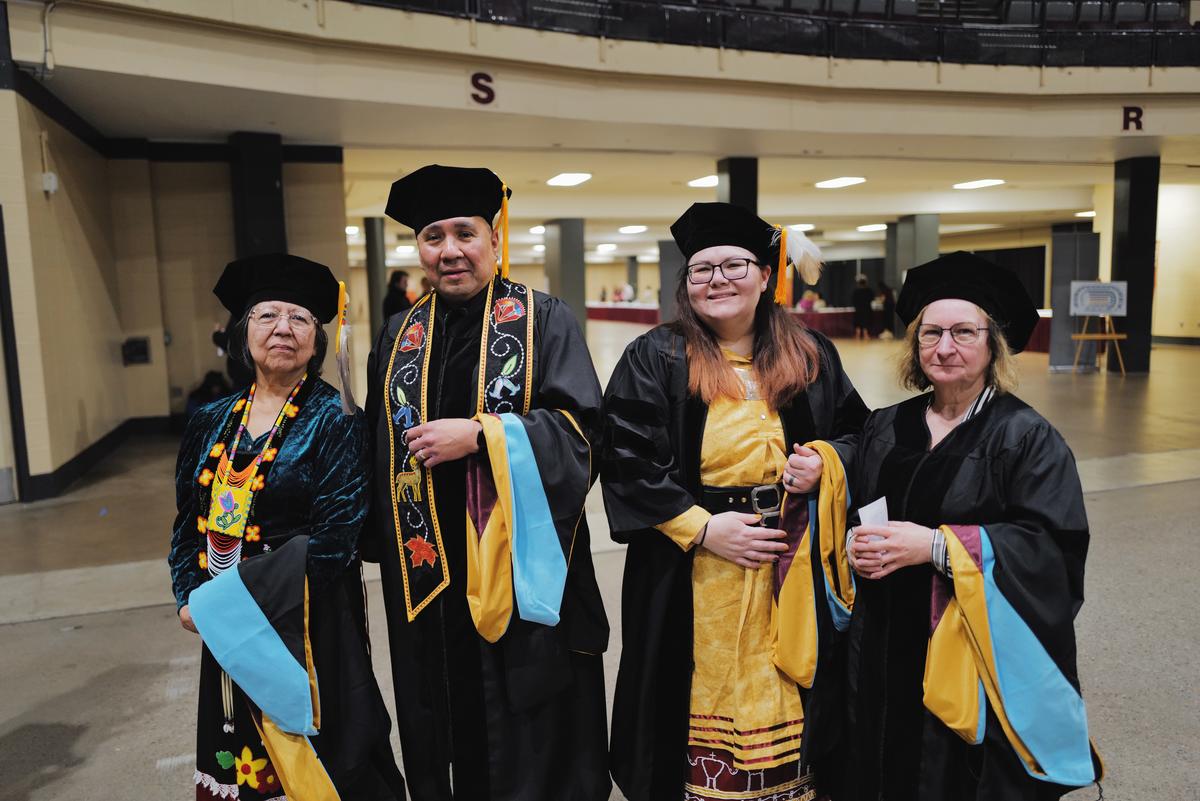After more than a decade of hard work, four Indigenous students: Priscilla Belisle, Marti Ford, Brian Jackson and Thelma Nayquonabe will receive Doctorate of Education (Ed.D.) degrees from UMD this spring.
The four soon-to-be graduates were recruited to a special cohort of UMD’s Ed.D. program, which has a unique focus on Indigenous education, in 2011.
The professors who started the Ed.D. program were intentional about creating a program through an Indigenous cohort that would support Native professionals in education, both as practitioners and as they became scholars, according to Associate Professor Lynn Brice.
Brice has served as an advisor for students in the cohort. “For me, personally, it’s been an honor and a privilege to have worked with them as a course instructor and their advisor. Their work is significant. It’s important to their communities and to Indigenous education,” says Brice. “It can also inform public institutions like UMD. We have a ways to go in terms of authentically understanding diversity.”
Obtaining this degree has been a lesson in perseverance for all of the scholars, according to Belisle, who notes that they each had to take time off from the program to tend to their work and personal lives. “For whatever reasons, we all stepped away and we all came back. We realized the value of finishing the degree,” she says.
These future UMD alumni and those from the cohort who graduated before them are role models in their communities. Each is giving back to their communities and sharing lessons learned.
Priscilla Belisle: Cultural identity and college success
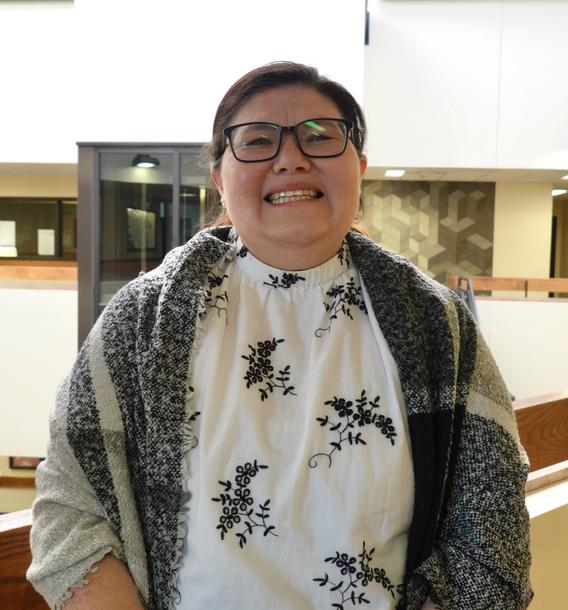
Priscilla Belisle is a member of the Oneida Nation. She was born and raised on the Oneida reservation near Green Bay. Her dissertation research grew out of her own experience as a Native woman attending predominantly white institutions (PWI) of higher education.
Navigating PWIs to attain her academic degrees was challenging for Belisle, who was raised with a strong sense of cultural identity. “Coming from a community that is matriarchal to a university that is patriarchal with Western values was difficult,” she admits.
Belisle was curious about whether young Native women today are facing similar challenges when they leave their communities to go to college. For her dissertation project, she recruited three young Oneida women who were raised within their culture and attending PWIs.
The research involved one-on-one interviews with the women as well as group talking circle discussions. Belisle framed her research with Oneida cultural values. She wanted to see how the young women’s Yukwatsistayʌ, which translates to “fire—or the spirit within each of us” was affected by challenges they faced. Encountering challenges or “dissonance” is viewed as an opportunity for growth and self-actualization within Belisle’s culture.
Belisle says the students were optimistic because their institutions had public-facing narratives about the importance of diversity, equity and inclusion. Still, the students reported bias, microaggressions and other challenges such as professors having different perspectives or interacting with Native students not raised culturally.
“One of the main things I found was that there was a really synergistic relationship between their experience of dissonance and their fire,” says Belisle.
When the students experienced dissonance, what they knew to be true was being challenged. So they “engaged their fire,” Belisle explains. They called home and talked to their mothers or sisters. They engaged in cultural traditions like singing or beading. They used cultural support to help them work through their difficulties.
In doing so, and in talking through their experiences, they were able to reconstruct their views. This “reflexive process helped propel them into significant periods of growth. By part in studying and breaking down their experiences with me and each other, by talking and reflecting on what they were going through,” says Belisle. “Having that sense of community and bonding helped them persist.”
Through the process of strengthening their fire, these young women solidified their identities and gained the “fuel to embody other cultural values,” such as “encouraging others” and “doing things that are right and just,” says Belisle.
This is a positive conclusion that Belisle believes can be applied beyond academia. The study helps to “understand how to help and encourage young people, regardless of their path,” she says.
Belisle works in outreach at the Oneida Nation Language Department and intends to continue to grow in this role, educating about language and culture in a “safe and welcoming way.” She feels a sense of reciprocity. “I want to bring what I’m learning back to my community. To do something to benefit my community in the long run.”
Marti Ford: Self-knowledge of Indigenous youth
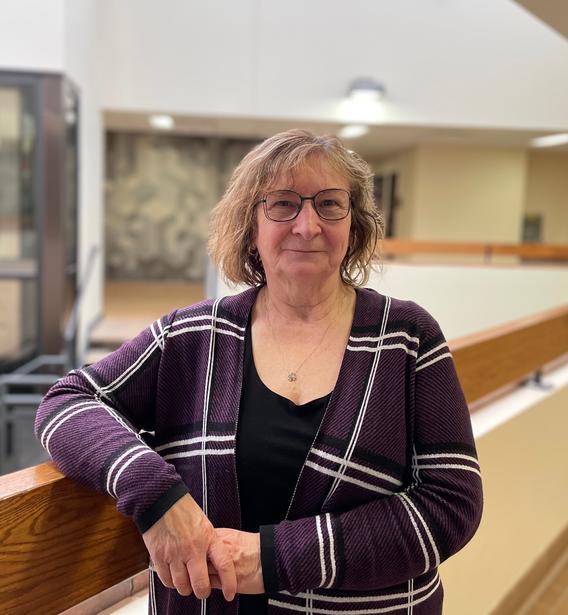
Marti Ford is an Inuk woman who has devoted her career to education. She has worked as a teacher and school administrator, serving as a principal, superintendent and dean.
When Ford applied to UMD’s educational doctorate program she was the dean of the School of Indigenous Education at Red River College in Winnipeg. “I was looking for an Indigenous program that a person could do while working full-time. I wanted a focus on Indigenous Education,” she says, noting that she appreciated that classes were only in person one weekend a month since she had to drive 7 ½ hours from Winnipeg.
Ford acknowledges that the program required “a lot of hard work,” and suggests, “It would probably be much easier to do when younger and not holding a full-time job that requires constant travel.”
One lesson Ford wants to share with those who may be interested in doctoral work is to “really know what it is you are interested in studying when you embark on the journey of completing a doctorate.”
Ford’s dissertation topic is related to the “self-knowledge of Indigenous youth who have left home at a young age to complete their high school education.” Because many small communities in northern Manitoba are remote and don't have high schools, students need to move from their communities to attend a school with a residence to continue their education.
“I chose the topic because I work at Frontier School Division and it has always interested me … I went into this because I was worried about the kids,” says Ford. She points out that it’s a big leap of faith for families to put trust in such educational institutions, considering the historical abuse perpetrated against Indigenous people at boarding schools in Canada and the United States.
Ford interviewed students in grades 11 and 12 and conducted focus groups for her research, using an Indigenous lens. Frontier School is a unique environment because students come from many different First Nation communities and may not share the same cultural teachings, according to Ford.
Interview questions were related to student cultural knowledge and self-awareness. Ford wanted to assess if youth “understood the cultural teachings of their communities in relation to knowing themselves.” She identified a Cree word that exemplified this idea. Kiskêyimisowin translates to self-knowledge or the concept of knowing who you are, where you come from and where you are going.
In the end, Ford was pleased with what she discovered through the conversations. “I was surprised at how much self-reflection they had done as adolescents,” she says, noting that the youth were grounded in their cultural teachings, resilient and connected to their home communities.
Students felt a sense of responsibility to others. They expressed care and concern for their peers. They also talked about wanting to bring their education back to their communities.
“This is positive to know that these programs are working for kids,” Ford says. The findings give her hope because, as she points out, youth will be the next generation of leaders.
“There is always reference to the culture being lost and this is a positive study that shows some families are still maintaining their culture and the youth I spoke with were being brought up in their cultural ways,” Ford says.
Brian Jackson: Leading from the middle
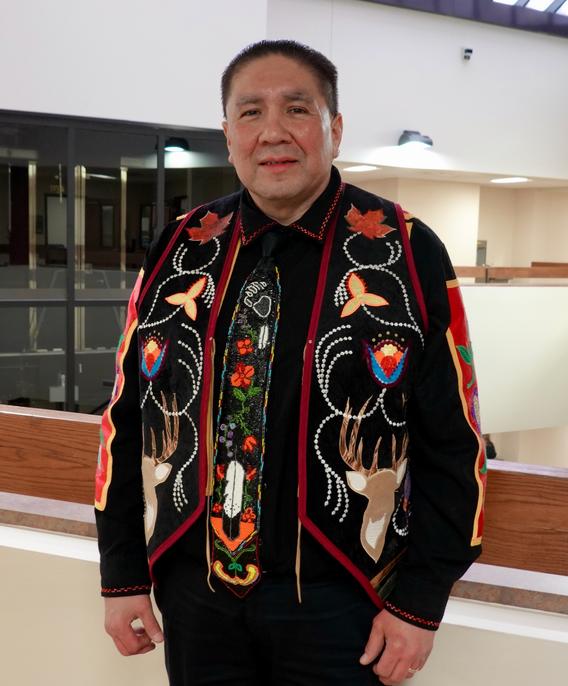
Once Brian Jackson’s final project was passed by his committee in April, friends and colleagues started calling him “Dr. Jackson.” But the Lac Du Flambeau Ojibwe tribal member shies away from titles and acronyms. “I appreciate the props but I’m still Brian,” he maintains.
Jackson has spent much of his career working to integrate American Indian education into K-12 curriculum in Wisconsin. Under Act 31, Wisconsin public schools are required to provide a comprehensive education about the state’s 11 federally-recognized American Indian nations and tribal communities.
“What defines me is rolling up my sleeves, being in the trenches, hearing the voices around me of students, teachers, parents and community members,” he says.
This type of humility was one of the common themes that Jackson found during his dissertation research, as he interviewed leaders in American Indian education across Wisconsin.
The way Act 31 is implemented varies widely across schools and depending on their leadership. As part of his research, Jackson looked at some of the Native leaders who were doing exemplary work in this arena across the state.
Jackson had a vision for his project. He didn’t want it to be a book that sat on a shelf collecting dust, he wanted it to be useful to others. He also wanted to acknowledge and chronicle the important people and the work happening in Indigenous education. “Nobody is talking about this,” he says.
So he decided to make a documentary, interviewing key Native leaders to glean some insight into what they’re doing to ensure that future generations learn about American Indian history, culture, and tribal sovereignty.
The film includes an array of individuals, including curriculum heads, language heads, superintendents and principals. Jackson emphasizes that in Indigenous culture, there is an understanding that “everyone has an important role, no one person is more important than another.”
This theme of “diverse, distributed leadership,” where all roles are viewed as having a potential impact on student success has been characterized in the field as “leading from the middle.” Jackson was inspired to discover that this model is being successfully applied by Māori in educational settings in New Zealand.
Jackson hopes his project will serve as a legacy. “I wanted to create a tool, a guide, a playbook to inspire folks to take on leadership positions,” he says. “My intent was to show young people they can be in positions of leadership and reflect their communities.”
For Indigenous students in predominantly white schools or with predominantly white teachers and administrators, seeing representation is particularly important, according to Jackson. “In a lot of communities, Natives aren’t in leadership positions. Students need to see themselves reflected in different positions, not just entry-level positions.”
The documentary features some common themes in its commentary. The leaders all spoke of service to community. They suggested that the formation of identity is a critical piece of Indigenous education and recommend integrating culture into all aspects of learning. “Students need to be proud of where they come from,” explains Jackson.
Jackson previously served as the behavioral health director and cultural connections coordinator at the Lac du Flambeau Public Schools. He was recently hired as an assistant professor at the Medical College of Wisconsin. He’s thankful for the opportunity to be a “liaison for Indian Country” and to continue to recruit, mentor and inspire students in their educational journeys.
“My biggest learning comes from students. They’re the future,” he says. “We need to hear their collective voices.”
Thelma Nayquonabe: elder influence in the classroom
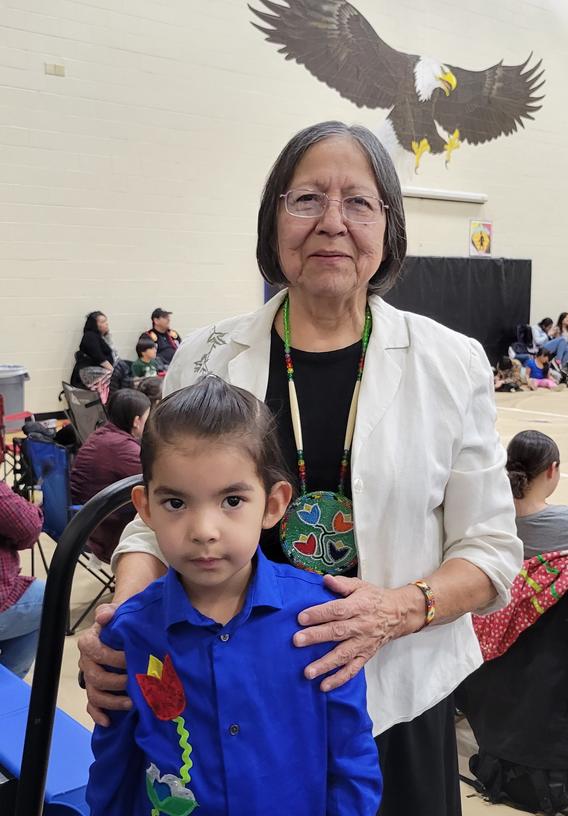
An elder of the Lac Courte Oreilles Ojibwe tribe and a great-grandmother, Thelma Nayquonabe is not a typical UMD student. Her journey to attaining her educational doctorate has included a number of unique challenges, from learning new technology to coping with health concerns and family tragedy. In spite of these struggles, she will attain her Ed.D. this spring.
Nayquonabe is from the wolf clan. She was born near her father’s home in Mille Lacs, Minnesota and raised at the Lac Courte Oreilles reservation in Wisconsin, her mother's home. Her proudest accomplishment in life has been raising four children who “turned out to be good people” who are “respectful and kind” and “grounded in who they are as Anishinaabe people.”
Achieving a doctoral degree is another achievement that matters to her. It translates to respect for Nayquonabe’s work among academics. She wants to lift the voices of her community in relation to Indigenous education. “Parents, grandparents and all of our ancestors deserve to have their stories told. That’s what this is about,” she says.
Nayquonabe’s lengthy career in the field of Indigenous education began in 1975. She was inspired to volunteer at the Lac Courte Oreilles Ojibwe School, which was established as an alternative after a student walkout at Hayward High School protesting racism.
“I was told if I volunteered I could probably get a job,” Nayquonabe says. She was eventually hired as an aide at the K-3 school and completed a bachelor’s degree in elementary education while working there.
Nayquonabe’s path continued from there. She was sought out and recruited for various positions based on her expertise. First, she was trained to serve as director of an area Head Start. Then she went on to teach both at the elementary level and as a specialist in Ojibwe language, history and culture at the middle school level. She obtained a master’s degree in teaching and learning and eventually served as an elementary school principal.
The paperwork involved in her administrative roles wasn’t appealing to Nayquonabe. She prefers hands-on work and consulting that makes a difference for children. When she heard about UMD’s doctoral program, she knew she had to apply.
Nayquonabe’s dissertation focused on how schools can help Indigenous children succeed. She interviewed three teachers and three elders who spend time in elementary classrooms. The purpose of her study was to determine the teachers’ and elders’ shared vision of teaching children about what it means to be Anishinaabe.
Interviewing teachers was straightforward but getting elders to share their opinions about the best way to work with students in the classroom was more of a challenge, according to Nayquonabe. There would be long, thoughtful silences during the elder’s interviews. “They would stop and think for a long time,” she says. An Ojibwe teacher characterized this as “the Indigenous pause,” according to Nayquonabe.
Such humility is a cultural value. “We were always taught—my mother taught me this—you can’t make up anything, you can only say what you know,” says Nayquonabe.
Nayquonabe felt a sense of responsibility to gather and share these perspectives. She had her son smudge her with sage and cedar to help “tell the stories the right way.”
Through persistence and patience, Nayquonabe identified some common themes from her research. One primary theme was the significance of learning respect. “Teachers and elders all talked about how kids need to learn respect for themselves, for teachers, for the environment, for everything,” she says.
All of the interviewees felt that language and culture were critical, that children need to know themselves. They also agreed that elders should have a prominent role in the classroom.
“They need to be proud to be Anishinaabe—who better to teach them that than elders?” asks Nayquonabe.
Moving forward, Nayquonabe wants to share the knowledge gained from elders and her research with others. She’s currently serving as a consultant for a grant for early childhood teachers in Duluth and will carefully consider other opportunities that facilitate sharing of such knowledge. “I don’t do projects for just anybody, it has got to be something I believe in that will help people,” she says.
